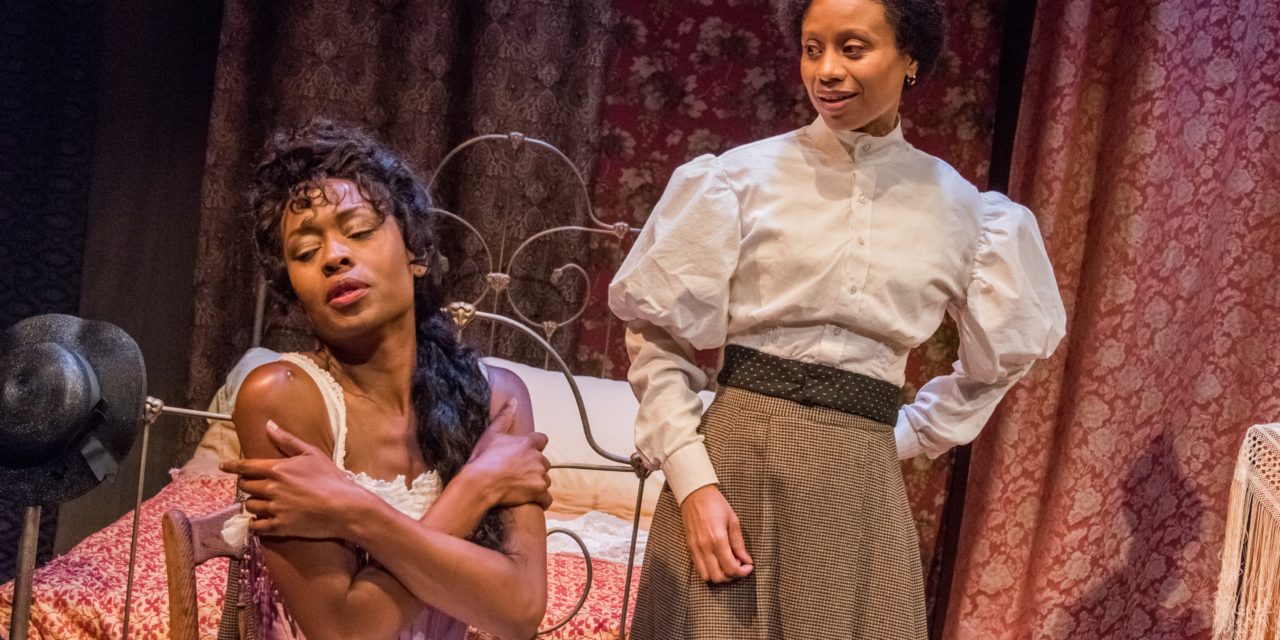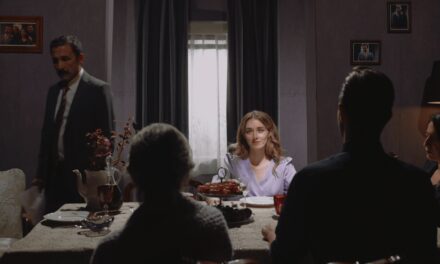To revive a play by Lynn Nottage is to revive nuance. Under the direction of Daniela Varon, Intimate Apparel shows this summer at Shakespeare & Company in the Berkshires. Set in 1905, the highlighted perspectives skew primarily black and female—a welcome pivot from the established canon. Though common “types” (such as prostitute, working class, observant Jew, immigrant, and wealthy elite) are employed, Nottage writes them in such a way that we get to see who the characters are without exploiting their conditions. For a work in which fabric and apparel are central to themes and plot movement, the attentiveness to detail of Molly Trainer’s costume design and cohesive collaboration with Sandra Goldmaker’s set design both enrich the production substantially.
The superior writing of Intimate Apparel provides capable actors the framework to really flex, which in this rendition they are and they do, and the result is delightful. Nehassaiu deGannes, who stars as Esther, embodies the role of the seamstress with impressive range and precision of subtlety. We first meet her in the rooming-house of Mrs. Dickson (MaConnia Chesser), and are quickly introduced to the theme of compromise and sacrifice that inhabits the structure of the play. By the time Mrs. Dickson delivers a moving monologue about her mother, we’re already weighted by several tangents in which the settlement of one cost proves to buy the privilege of paying a different price.
Mrs. Van Buren (Christianna Nelson) is the most outwardly privileged character. Neglected by her husband and isolated by her monetary wealth, she feels a fondness for Esther beyond the clothes-making transactions that bring them in contact. Esther rightfully calls out the pretense in Mrs. Van Buren’s sentiment, challenging the white woman’s unwillingness to show her any respect in public. Mrs. Van Buren is also caught in the contradiction of disparaging suffragettes in one moment, only to soon be dreaming of freedoms she imagines finding in bohemian life. Through witnessing her confusions and the reality that informs them, the shared poverty of womanhood with its limited options, restrictions, and plain subjugation neatly imbues their dynamic with a deeper layer.
In a performance of engaging and controlled charisma, Medina Senghore plays the wealthy woman’s foil, a piano player slash prostitute named Mayme. Esther and Mayme are close friends despite their opposite personalities, and the tolerance they display for each other’s discrepancies later adds to the force and sting of Nottage’s plot twists. Mayme’s path offers a glimpse into unbreakable strength, expected yet nonetheless poignant tragedy, and a reminder that exoticism works in more than one direction.
Now for the men. As though not breaking a sweat from her exceptional handling of race, class, and gender, Nottage delivers an intersection of religion, too. Esther’s adorably awkward mutual flirtations with strictly-observing Jewish tailor Mr. Marks (played with remarkable specificity by Tommy Schrider) embroider another layer of external restrictions bearing complications on individual relations. Strongly compatible but deterred by surface differences, their unmanifested romance lingers as a muted loss beneath the play’s more overt damages.
Esther’s romantic impulse instead comes to fruition with George (convincingly played by Lee Edward Colston II), who courts her through letter-writing from over in Panama. George sincerely reports on the grotesque waste he observes while working his way to the States, which proves a grim foreshadowing of his own wasteful behavior upon arriving. His character is fully-developed and evokes a range of emotions; none, however, are as devastating as those evoked in his final transgression against Esther.
While Esther doesn’t accept racial oppression as an obstruction to her dreams, she eventually cedes her power to the limitation of possibility implied by her gender. Groans from the audience while watching Esther voluntarily sacrifice her life’s work were perceptibly female at the opening night: assets surrendered for the sake of a male-spun manipulation hit a live nerve. Ultimately, the women in Intimate Apparel step beyond their prior quarrels and help each other transcend some of the male mythologies that previously entrapped them. True to form, they reengage their stamina begin a new cycle of hard work and sacrifice.
Throughout the play, the dialogue between each pair of players reveals the surprise in learning the specific struggles of the other. Even though most characters are dreamers, the repressive conventions they were reared with have molded them into insecure versions of themselves. Nuanced exchanges prompt consideration of such questions as, “What constitutes a relationship?” and “Can love be valid if it’s only expressed behind closed doors?”. Nottage also resurrects the lost art of innuendo and delivers a climax that really counts: the dividend of two preceding hours of expert control. In the context of our modern state—basically a constant, frantic climax—the remainder of smart pacing is refreshing.
Playwright: Lynn Nottage
Director: Daniela Varon
Columnist: Rachel E. Diken
Regional at Shakespeare & Company in Lenox, MA
July 20, 2017—August 13, 2017
First published by The Atticus Review on July 28, 2017. Reposted with permission.
This post was written by the author in their personal capacity.The opinions expressed in this article are the author’s own and do not reflect the view of The Theatre Times, their staff or collaborators.
This post was written by Rachel E. Diken.
The views expressed here belong to the author and do not necessarily reflect our views and opinions.


















